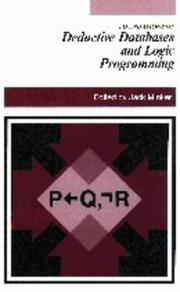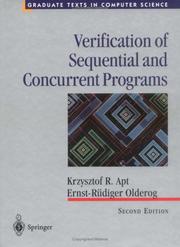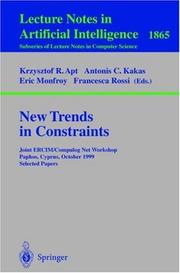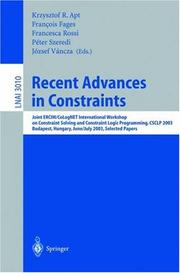| Listing 1 - 8 of 8 |
Sort by
|

ISBN: 013230368X 9780132303682 Year: 1997 Publisher: Englewood Cliffs, NJ : Prentice-Hall International,
Abstract | Keywords | Export | Availability | Bookmark
 Loading...
Loading...Choose an application
- Reference Manager
- EndNote
- RefWorks (Direct export to RefWorks)
Logic programming. --- Prolog (Computer program language). --- Deduction and theorem proving: answer/reason extraction; reasoning; resolution; metatheory; mathematical induction; logic programming (Artificial intelligence) --- 681.3*I23 Deduction and theorem proving: answer/reason extraction; reasoning; resolution; metatheory; mathematical induction; logic programming (Artificial intelligence) --- Logic programming --- Prolog (Computer program language) --- 681.3*I23 --- Computer programming --- Programmation logique --- PROLOG (Langage de programmation) --- Prolog (langage de programmation) --- Prolog (computer language)

ISBN: 0934613400 1322469830 1483221121 9780934613408 Year: 1988 Publisher: Los Altos : M. Kaufmann,
Abstract | Keywords | Export | Availability | Bookmark
 Loading...
Loading...Choose an application
- Reference Manager
- EndNote
- RefWorks (Direct export to RefWorks)
Programming --- Artificial intelligence. Robotics. Simulation. Graphics --- Information systems --- Deductive databases --- Bases de données déductives --- Deductive data bases --- Database management: security; integrity; protection--See also {?681.5*E5} --- Artificial intelligence (AI) in general; cognitive simulation; philosophical foundations --- Deduction and theorem proving: answer/reason extraction; reasoning; resolution; metatheory; mathematical induction; logic programming (Artificial intelligence) --- 681.3*I23 Deduction and theorem proving: answer/reason extraction; reasoning; resolution; metatheory; mathematical induction; logic programming (Artificial intelligence) --- 681.3*I20 Artificial intelligence (AI) in general; cognitive simulation; philosophical foundations --- 681.3*H2m Database management: security; integrity; protection--See also {?681.5*E5} --- 681.3*H2 Database management: security; integrity; protection--See also {?681.5*E5} --- Bases de données déductives --- Logic programming --- 681.3*H2m --- 681.3*H2 --- 681.3*I20 --- 681.3*I23 --- Computer programming --- Databases --- Logic Programming --- Programmation logique
Book
ISBN: 9780521198660 9780511973468 9781139010276 1139010271 0511973462 0521198666 1107215153 1283099039 9786613099037 1139009753 1139007017 1139008129 1139009222 Year: 2011 Publisher: Cambridge : Cambridge University Press,
Abstract | Keywords | Export | Availability | Bookmark
 Loading...
Loading...Choose an application
- Reference Manager
- EndNote
- RefWorks (Direct export to RefWorks)
Games provide mathematical models for interaction. Numerous tasks in computer science can be formulated in game-theoretic terms. This fresh and intuitive way of thinking through complex issues reveals underlying algorithmic questions and clarifies the relationships between different domains. This collection of lectures, by specialists in the field, provides an excellent introduction to various aspects of game theory relevant for applications in computer science that concern program design, synthesis, verification, testing and design of multi-agent or distributed systems. Originally devised for a Spring School organised by the GAMES Networking Programme in 2009, these lectures have since been revised and expanded, and range from tutorials concerning fundamental notions and methods to more advanced presentations of current research topics. This volume is a valuable guide to current research on game-based methods in computer science for undergraduate and graduate students. It will also interest researchers working in mathematical logic, computer science and game theory.
Game theory. --- Computer science --- Théorie des jeux --- Informatique --- Mathematics. --- Mathématiques --- Game theory --- Mathematics --- Théorie des jeux --- Mathématiques --- Operational research. Game theory --- Games, Theory of --- Theory of games --- Mathematical models --- Computer mathematics --- Electronic data processing --- Computer science - Mathematics

ISBN: 0387948961 Year: 1997 Publisher: New York : Springer-Verlag,
Abstract | Keywords | Export | Availability | Bookmark
 Loading...
Loading...Choose an application
- Reference Manager
- EndNote
- RefWorks (Direct export to RefWorks)
Computer software --- Logiciels --- Verification --- Vérification --- Vérification --- Computer. Automation --- Verification.
Book
ISBN: 9089640576 9786612067976 1282067974 9048506425 9789048506422 9789089640574 Year: 2008 Publisher: Amsterdam : Amsterdam University Press,
Abstract | Keywords | Export | Availability | Bookmark
 Loading...
Loading...Choose an application
- Reference Manager
- EndNote
- RefWorks (Direct export to RefWorks)
This volume is a collection of papers presented at the 2007 colloquium on new perspectives on games and interaction at the Royal Dutch Academy of Sciences in Amsterdam. The purpose of the colloquium was to clarify the uses of the concepts of game theory, and to identify promising new directions. This important collection testifies to the growing importance of game theory as a tool to capture the concepts of strategy, interaction, argumentation, communication, cooperation and competition. Also, it provides evidence for the richness of game theory and for its impressive and growing application.
Evolution (Biology) --Mathematical models. --- Game theory -- Congresses. --- Game theory. --- Logic, Symbolic and mathematical -- Congresses. --- Game theory --- Logic, Symbolic and mathematical --- philosophy --- economics --- economie --- filosofie --- mathematics --- wiskunde
Book
ISBN: 184882744X 1848827458 1447125134 Year: 2009 Publisher: London : Springer London : Imprint: Springer,
Abstract | Keywords | Export | Availability | Bookmark
 Loading...
Loading...Choose an application
- Reference Manager
- EndNote
- RefWorks (Direct export to RefWorks)
Computer programs are an indispensable part of many of the systems we rely upon in our daily lives, and the proper functioning and safety of these systems is of paramount importance. The development of methods that ensure program correctness is therefore a key challenge for computer scientists. This widely anticipated third edition of Verification of Sequential and Concurrent Programs provides a systematic exploration of one of the most common approaches to program verification, known as the "assertional" approach. Following the successful formula of previous editions, this approach is applied to deterministic and nondeterministic sequential programs of varying complexity, together with both parallel and distributed concurrent programs. The expanded content of this thorough new edition also includes coverage of the verification of object-oriented programs. For each class of programs, the authors introduce an operational semantics and proof systems for the verification of partial and total correctness, justified formally in corresponding soundness theorems. Case studies supplied throughout the book demonstrate the use of the proof systems to formally verify solutions to classical problems, such as sorting, manipulation of lists, producer/consumer and mutual exclusion. Topics and Features: Includes a thorough introductory section, familiarizing the reader with the basic concepts and notation used in the book, as well as the book’s structure Explains Hoare’s approach to program verification for while programs, providing a correctness proof of a program for partitioning an array (NEW) Concludes each chapter with exercises and bibliographic remarks for further reading Discusses recursive programs that extend deterministic programs by parameterless procedures and procedures with the call-by-value parameter mechanism, and provides a correctness proof of the quicksort program (NEW) Explores nondeterministic and distributed programs, presenting a verification method of distributed programs based on a transformation into nondeterministic ones Presents object-oriented programs, with a focus on the main characteristics of objects (NEW) Investigates parallel programs with shared variables and with synchronization Studies the issue of fairness in the framework of nondeterministic programs, using an approach based on the method of explicit schedulers Includes a Foreword by Professor Amir Pnueli This modern update of a classic, reader-friendly textbook is perfect for an introductory course on program verification for advanced undergraduate or graduate students, and may also be used as an introduction to operational semantics. Outlines for possible courses are suggested in the Preface to the book. This book is unique in addressing assertional verification of all essential classes of imperative programs: while programs, recursive programs, object-oriented programs, nondeterministic programs, parallel programs, and distributed programs.
Computer software --- Computer Science --- Engineering & Applied Sciences --- Verification --- Verification. --- Testing. --- Software, Computer --- Software verification --- Verification of software --- Computer science. --- Algorithms. --- Computer logic. --- Mathematical logic. --- Computer Science. --- Logics and Meanings of Programs. --- Mathematical Logic and Formal Languages. --- Algorithm Analysis and Problem Complexity. --- Computer systems --- Logic design. --- Computer software. --- Informatics --- Science --- Design, Logic --- Design of logic systems --- Digital electronics --- Electronic circuit design --- Logic circuits --- Machine theory --- Switching theory --- Algorism --- Algebra --- Arithmetic --- Algebra of logic --- Logic, Universal --- Mathematical logic --- Symbolic and mathematical logic --- Symbolic logic --- Mathematics --- Algebra, Abstract --- Metamathematics --- Set theory --- Syllogism --- Computer science logic --- Logic, Symbolic and mathematical --- Foundations

ISBN: 3540678859 3540446540 Year: 2000 Publisher: Berlin, Heidelberg : Springer Berlin Heidelberg : Imprint: Springer,
Abstract | Keywords | Export | Availability | Bookmark
 Loading...
Loading...Choose an application
- Reference Manager
- EndNote
- RefWorks (Direct export to RefWorks)
This book constitutes the thoroughly refereed post-proceedings of the Joint ERCIM/Compulog-Net Workshop on New Trends in Constraints held in Paphos, Cyprus, Greece in October 1999. The 12 revised full research papers presented together with four surveys by leading researchers were carefully reviewed. The book is divided in topical sections on constraint propagation and manipulation, constraint programming, and rule-based constraint programming.
681.3*D1 --- 681.3*D32 --- 681.3*D33 --- 681.3*I23 --- 681.3*I24 --- Programming techniques--See also {681.3*E} --- language classifications: applicative languages; data-flow languages; design languages; extensible languages; macro and assembly languages; nonprocedural languages; specialized application and very high-level languages (Programminglanguages) --- Languages constructs: abstract data types; concurrent programming structures;control structures; coroutines (Programming languages) --- Deduction and theorem proving: answer/reason extraction; reasoning; resolution; metatheory; mathematical induction; logic programming (Artificial intelligence) --- Knowledge representation formalisms and methods: frames and scripts; predicate logic; relation systems; representation languages; procedural and rule-based representations; semantic networks (Artificial intelligence) --- Computer Science --- Engineering & Applied Sciences --- 681.3*I24 Knowledge representation formalisms and methods: frames and scripts; predicate logic; relation systems; representation languages; procedural and rule-based representations; semantic networks (Artificial intelligence) --- 681.3*I23 Deduction and theorem proving: answer/reason extraction; reasoning; resolution; metatheory; mathematical induction; logic programming (Artificial intelligence) --- 681.3*D33 Languages constructs: abstract data types; concurrent programming structures;control structures; coroutines (Programming languages) --- 681.3*D32 language classifications: applicative languages; data-flow languages; design languages; extensible languages; macro and assembly languages; nonprocedural languages; specialized application and very high-level languages (Programminglanguages) --- 681.3*D1 Programming techniques--See also {681.3*E} --- Constraint programming (Computer science) --- Computer science. --- Computer programming. --- Programming languages (Electronic computers). --- Computer logic. --- Mathematical logic. --- Artificial intelligence. --- Computer Science. --- Artificial Intelligence (incl. Robotics). --- Programming Languages, Compilers, Interpreters. --- Programming Techniques. --- Logics and Meanings of Programs. --- Mathematical Logic and Formal Languages. --- AI (Artificial intelligence) --- Artificial thinking --- Electronic brains --- Intellectronics --- Intelligence, Artificial --- Intelligent machines --- Machine intelligence --- Thinking, Artificial --- Bionics --- Cognitive science --- Digital computer simulation --- Electronic data processing --- Logic machines --- Machine theory --- Self-organizing systems --- Simulation methods --- Fifth generation computers --- Neural computers --- Algebra of logic --- Logic, Universal --- Mathematical logic --- Symbolic and mathematical logic --- Symbolic logic --- Mathematics --- Algebra, Abstract --- Metamathematics --- Set theory --- Syllogism --- Computer science logic --- Logic, Symbolic and mathematical --- Computer languages --- Computer program languages --- Computer programming languages --- Machine language --- Languages, Artificial --- Computers --- Electronic computer programming --- Electronic digital computers --- Programming (Electronic computers) --- Coding theory --- Informatics --- Science --- Programming --- Logic design. --- Artificial Intelligence. --- Design, Logic --- Design of logic systems --- Digital electronics --- Electronic circuit design --- Logic circuits --- Switching theory


ISBN: 1280307331 9786610307333 3540246622 3540218343 Year: 2004 Publisher: Berlin, Heidelberg : Springer Berlin Heidelberg : Imprint: Springer,
Abstract | Keywords | Export | Availability | Bookmark
 Loading...
Loading...Choose an application
- Reference Manager
- EndNote
- RefWorks (Direct export to RefWorks)
Constraint programming is the fruit of several decades of research carried out in mathematical logic, automated deduction, operations research and arti?cial intelligence. The tools and programming languages arising from this research ?eldhaveenjoyedrealsuccessintheindustrialworldastheycontributetosolving hard combinatorial problems in diverse domains such as production planning, communication networks, robotics and bioinformatics. This volume contains the extended and reviewed versions of a selection of papers presented at the Joint ERCIM/CoLogNET International Workshop on Constraint Solving and Constraint Logic Programming (CSCLP2003), which was held from June 30 to July 2, 2003. The venue chosen for the seventh edition of this annual workshop was the Computer and Automation Research Institute of the Hungarian Academy of Sciences (MTA SZTAKI) in Budapest, Hungary. This institute is one of the 20 members of the Working Group on Constraints of the European Research Consortium for Informatics and Mathematics (ERCIM). For many participants this workshop provided the ?rst opportunity to visit their ERCIM partner in Budapest. CoLogNET is the European-funded network of excellence dedicated to s- porting and enhancing cooperation and research on all areas of computational logic, and continues the work done previously by the Compulog Net. In part- ular, the aim of the logic and constraint logic programming area of CoLogNET is to foster and support all research activities related to logic programming and constraint logic programming. The editors would like to take the opportunity and thank all the authors who submitted papers to this volume, as well as the reviewers for their helpful work.
Computer science. --- Logic design. --- Artificial intelligence. --- Computer Science. --- Artificial Intelligence (incl. Robotics). --- Programming Techniques. --- Programming Languages, Compilers, Interpreters. --- Logics and Meanings of Programs. --- Mathematical Logic and Formal Languages. --- Constraint programming (Computer science) --- Logic programming --- Computer Science --- Engineering & Applied Sciences --- Software engineering. --- Computer programming. --- Programming languages (Electronic computers). --- Computer logic. --- Computer industry. --- Software Engineering/Programming and Operating Systems. --- The Computer Industry. --- Artificial Intelligence. --- Design, Logic --- Design of logic systems --- Digital electronics --- Electronic circuit design --- Logic circuits --- Machine theory --- Switching theory --- Informatics --- Science --- Electronic industries --- AI (Artificial intelligence) --- Artificial thinking --- Electronic brains --- Intellectronics --- Intelligence, Artificial --- Intelligent machines --- Machine intelligence --- Thinking, Artificial --- Bionics --- Cognitive science --- Digital computer simulation --- Electronic data processing --- Logic machines --- Self-organizing systems --- Simulation methods --- Fifth generation computers --- Neural computers --- Computer software engineering --- Engineering --- Computer science logic --- Logic, Symbolic and mathematical --- Computer languages --- Computer program languages --- Computer programming languages --- Machine language --- Languages, Artificial --- Computers --- Electronic computer programming --- Electronic digital computers --- Programming (Electronic computers) --- Coding theory --- Programming
| Listing 1 - 8 of 8 |
Sort by
|

 Search
Search Feedback
Feedback About
About Help
Help News
News